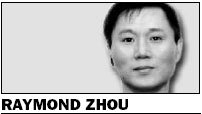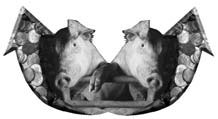Raymond Zhou
Pork price swing can be minimized
By Raymond Zhou (China Daily)
Updated: 2007-05-26 07:03
 |
Large Medium Small |
 Pork is the talk of town.
Pork is the talk of town.
In terms of the intensity of press coverage, it has overtaken real estate and almost rivaled the stock market as something that keeps rising and rising.
In the first three weeks of May, pork prices have increasely greatly. In most cities, the price has doubled in the past year, making grocery shopping a very unpleasant experience of partial inflation.
Only a few days ago some commentators were trying to play this phenomenon down by quoting people who said a 17-percent monthly price hike wouldn't really "affect us". Now many are suggesting that the government take action to curb the price surge. You can literally see the tide of public opinion ebb and flow as whitewashers turned from being politically correct to politically incorrect.
A price change in a staple food like pork disproportionately upsets the poor, as more of their disposable income goes to these items. The incentive for government intervention is tempting. However, unlike the ever-rising housing market, there is little that can be blamed on the government here. It is mostly the market at play, the invisible hand that is pushing up pork prices.
The main reason for the price hike is that the price was too low last year, therefore many farmers lost money and decided to quit the business. On top of that, feed prices have been going up. In Hunan Province, the heart of pig farming, 8 million fewer pigs were raised in the past year, severely draining supplies.
It is foreseeable that the pendulum will swing in the other direction next year: in pursuit of fat profits, a lot of farmers will jump into the business, again creating a supply glut and driving down prices.
This has been true of many agricultural products, including soybeans, peanuts and corn.
There is not much the government can do. The so-called reserve will just be a drop in the ocean. The pork reserve in Hunan translates into only 61,000 pigs, accounting for less than 1 percent of the shortfall. What's worse, there is a ripple effect. Vendors are nudging up the prices of other produce, such as eggs, beef and fish. This is the result of substitute shopping - buying something else when you wanted to buy pork, as advised by media experts.
The crisis will get worse before it gets better as the cycle of pig farming takes about half a year. While no short-term solution can be expected, we can at least learn the lesson and be smarter next time.
Price swings for agricultural products cannot be completely eliminated, but can be minimized. Since pork consumption is not a wildcard, demand can be calculated with relative accuracy.
Normally, this should be the task of the pig farming industry. Because China's pig farmers are not organized, the government has the responsibility to provide such a service. Demand forecasts can be cheaply distributed through electronic media such as radio and television, which are all government-owned and controlled. The incremental cost is very low.
That leaves the collection and analysis of data, which can be time-consuming. But we have many colleges and institutes that study agriculture. They have a duty to care about such things as next season's pork price. They are all government funded and live on salaries. Why explore hypothetical problems when you can solve real ones?
Market research and forecasting is not a foolproof science, but it beats the wild fluctuations that result from chasing short-term profits. A healthy futures market can also modulate the fluxes.
It is telling that nobody is calling for government price control a la the old days. For all its deficiencies, a market economy is better than a command economy. Managed well, it can win the hearts of grocery-shopping grannies.
Email: raymondzhou@chinadaily.com.cn
(China Daily 05/26/2007 page4)
| 分享按鈕 |